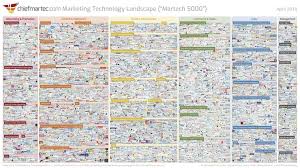In these difficult times, there is the very real need to reduce discretionary spending as much as possible. Every dollar we save in discretionary spending can be diverted to saving jobs.
I’ve discovered a solution–a huge source of discretionary spending, that is virtually wasted. If we stop spending in this area, millions can be saved and much of that can be diverted to retaining jobs.
Here’s the solution. Look at your technology stack for sales and marketing. Cancel your contracts for virtually 100% of the tools you are paying for. Divert that money into spending that has a higher impact.
Don’t get me wrong. These tools are very important, they can help dramatically improve productivity, performance, and your ability to reach the right customers with the right messages at the right time.
The problem is, we aren’t exploiting the tools in the way they produce the results. Stated differently, we are paying for capability we aren’t using—so we are just throwing money away.
This isn’t, a result of the pandemic. It’s something we’ve always done, but perhaps more visible in these confusing times. Somehow, the pandemic means I receive more meaningless emails, texts, or calls from more irrelevant suppliers, more frequently.
You probably experience the same thing. Every morning you open your email. You spend 15 minutes clearing dozens, if not hundreds of emails out of your inbox. These aren’t normal junk mails from Nigerian princes, people selling you a miracle cure for COVID 19, or any other scam. These are emails from well established companies, with powerful brands, and great solutions.
Somehow, I’m on their distribution list–whether it’s email or a SDR calling me. I’m not sure how I got onto the list. I’ve not visited their web site, I’ve not downloaded a white paper, I’ve not commented on anything their people may have written. Sometimes, I can guess how I got on their list.
But, the tools and technologies they are using are have so much more capability. They can segment the mailing/contact lists by any number of dimensions–title/position, industry, function, location, company size, propensity to buy, and any number of dimensions. These tools provide the capability to focus your message and target the right people with the right message at the right time.
The problem is, while the tools have these capabilities to improve our relevance and ability to connect with our target customer; we aren’t using those capabilities.
As an example, as I write this post, I quickly looked at my inbox. I have just received 4 of the same emails from one of the largest sales, marketing, analytics automation suppliers (a very large San Francisco based company). We are a current customer, so they have my business email, my profile, my company profile, and deep analytics on our history with them and utlization. But I’ve also gotten the same email on 3 other emails I use, a personal email, and two other emails I use for various purposes.
Clearly they have bought lists. But they haven’t used their own tools to scrub the lists or even segment them. Even if I look at the profile they have from my customer relationship with them, they would see the email they sent me is totally irrelevant to me, my interests, my business, or any simple analytics of what my company does with them and others. And their analytic solutions, if they used them, would show these 4 emails probably do more to piss me off then stimulate a response.
So rather than sending something that could be helpful and relevant to me, they’ve wasted my time, not just once, but 4 times, and they’ve caused me to question, “If they aren’t using the tools they sell to improve their ability to connect with customers, why should we be using them?”
This is just one of dozens of examples we each see every day. We have tools that enable us to sharpen our ability to connect with our prospects and customers in highly impactful ways. But we aren’t using them!
Sadly, it’s laziness and sloppiness on our parts. We have the capability, presumably we bought the tools to make us more productive and effective, but we aren’t doing the work to exploit the capability.
The vendors regale us with data about how these tools improve our productivity, impact, and effectiveness. We buy them, supposedly to do those things, yet we fail in how we utilize these tools.
If we aren’t committed to doing the things that we know produce results, then why spend the money on those things? Particularly, at a time when the need to manage costs and reduce discretionary spending is so important.
Stated crassly, “Fools with tools are still fools!”

Dave, I hate to say this but I got two email from you on this topic
Phil, I’m sorry for this. But what this means is that you have been receiving 2 emails from me virtually every day for as long as you have signed up for the blog posts to be emailed to you. Apparently you have subscribed under 2 email addresses. If you could let me know which email address you’d like me to eliminate, I’m glad to do so. Thanks for letting me know.